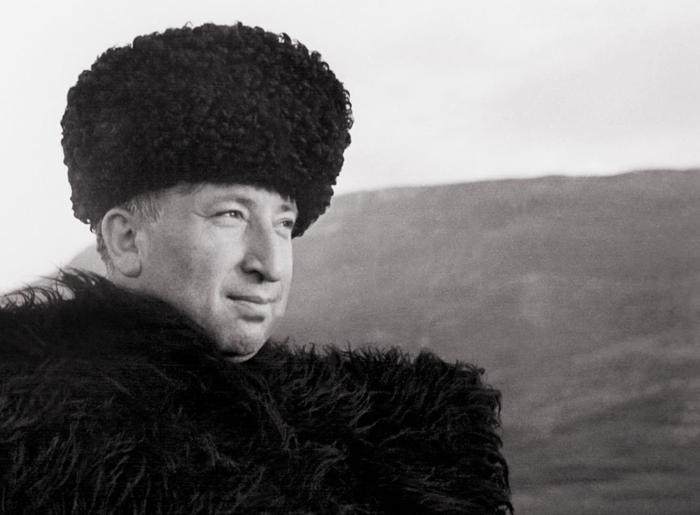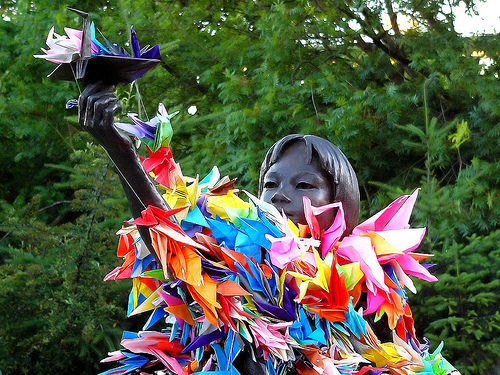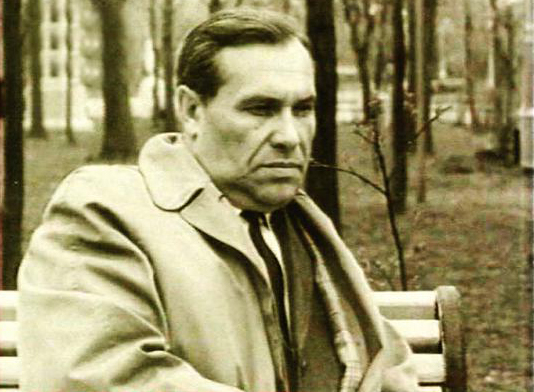‘’He is a huge poet, who made Dagestan and the Avar language and his mountains famous. His heart is wise, generous, lively. I saw him in many performances, where he remained a citizen, a wise man, a joker. With enemies he fought without mercy, beat them with wisdom, so he was not only a Dagestani, but also a Russian poet," Robert Rozhdestvensky spoke about Rasul Gamzatov. It is difficult to express it more precisely. The Soviet poet Gamzatov wrote in his native Avar, a language that has not prevented him from becoming one of the most popular poets in the whole of the USSR, collections of whose works were among the most widely read books in any library, in any part of the immense Union.
There are lines in the works of Rasul Gamzatov which were heard by everyone born in the USSR. This is the poem Cranes, first published in 1968 in the journal ‘New World’ in the translation of a long-time friend of Gamzatov, Nahum Grebnev. This work has a special story. Initially, in the first line, instead of the word ‘soldiers’ there was the word ‘horsemen’.
Sometimes, I feel that all those fallen horsemen,
Who never left the bloody battle zones,
Have not been buried to decay and molder
But turned into white cranes that softly groan.
When the actor and singer Mark Bernes – well-known, among other things, as a symbol of the war and the memory of him singing ‘The Dark Night’, as well as the post-war songs ‘From the Heroes of Times Past' (from the movie 'Officers'), and 'The Enemies Burned the Native House' – read the poem in the magazine, he realized that Cranes was ideal in its musical sound. Bernes telephoned the translator Nahum Grebnev and said that he wanted to make a song from it. The poet gave his consent; changes were made to the text, and he gained a wider voice, addressed to the entire Soviet people, relating, first of all, to the Great Patriotic War:
Sometimes, I feel that all those fallen soldiers,
Who never left the bloody battle zones,
Have not been buried to decay and molder
But turned into white cranes that softly groan.

The good and original poetry of Gamzatov was translated into Russian by such great poets as Robert Rozhdestvensky, Yunna Moritz, Yakov Kozlovsky and Elena Nikolayevskaya. Gamzatov chose the translators himself, usually from among friends from his times at the institute, of whose perfect mastery of words he had no doubt. However, the powerful impact of the poems of Rasul Gamzatov on the readers is impossible to explain just by the best professional translations and the genius of the author himself – the works of Gamzatov are greater than the sum of these parts. In his poems there is something that does not submit to the difficulties of translation, when the soul of the poem is lost. Sometimes one and the same work in translation and the original lose all connection, no matter how talented the author and the translator are. It is not that way with the verses of Gamzatov. They seem to speak directly to the reader, as if there is no gap between the Avar and Russian languages, and there is only a big common language of poetry, which responds to the soul of each reader. It was not in vain that an idea of a common language, understood by both people and birds, permeates the following lines:
They are flying, completing their long journey,
And are calling out someone's name.
Due to this, the cry of the cranes
Is similar to the Avar language over the ages.
A sensibility to art, an empathy for the inherent, lie in every person, and though the poem refers to the Avars, these lines speak of one's own to every reader, about something cherished, and it does not matter whether he is an Avar or not. The author speaks to the reader with images that evoje a call in every heart. And Gamzatov’s poems have their own meaning for everyone and they are important in their own way, but they are all equally fascinating.
The poem ‘Cranes’ is so famous that many do not even know the name of the author of the lines – their popularity goes far beyond their perception as poetry – these lines have long ago turned into a part of the collective consciousness and heritage of the inhabitants of the post-Soviet space, in one of the threads uniting them in a commonality, independent of ethnicity and national boundaries. Imagine our life without these lines – it is as difficult as imagining it without poetry in general. Each of these lines evoke feelings, but they are always true and deep. There is the pride of the fathers, grandfathers and great-grandfathers in these lines, who gave their lives for their country, and awareness of the fragility of human life, and a sense of the continuity of the generations and the indissoluble connection between man and nature.
How did the poet's life evolve, how did he come to the sense of a unity of man with nature, common to all languages?
Gamzatov writes about his birth and childhood:
I was born in the mountains, where in the gorge,
A river is flying in the rapid roll,
Where the song over my cradle
My mother sang in the Avar language.
His father had told him tales in Avar. The poet was forever imbued with a deep love for his mother tongue. The theme of the Avar speech permeates his work.
However, it was precisely the translations of his poems into Russian that made the poet famous, since this was the language of international communication in the USSR.
I love the language of those lullabies
and the tales that I heard as a child.
But I told of the boundless expanses
And all my fellows are my friends
Another language.
With it I went through the mountains,
To understand the greatness of the homeland
That was the powerful language, in which
Ilyich wrote and spoke.
And the heart of the son of a highlander, I'm used to
consider this great language as native.
These lines written by Rasul Gamzatov in his youth reflect the richness of the world of vision inherent to bilinguals. In this love of the two languages and cultures there is no duality, no contradictions. On the contrary, those who can name two languages as native have the ability to see the total behind the private, a keen understanding of the universal that unites people, regardless of their nationality, religion or culture. And Rasul Gamzatov, with his love of the two native languages and cultures, was intended by fate to unite people in general admiration for the beauty of the world and life. He translated Pushkin, Lermontov, Nekrasov, Mayakovsky and Tikhonov into the Avar language ... The unity of mankind for the poet is in the simple things that unite everyone – each person has a mother, native lands and native country, and everyone is a part of nature.
Books show us another way,
But for me, a person consists of
The displacement of sunlight,
The noise of birds and whispering rivers,
Shifting dews and misty spirals,
Songs of grass and silent space.
His huge work includes poems about the poet's place in history, his beloved mountains, the people who inhabited them, their customs, beautiful but harsh nature, about happiness and the pain of love. But the theme of a mother has always been special for him.
"... But a mother is still alive, while there's a fire
in her son's souls she has lit once"
A person learns to love through the love for a mother, who is the closest person on this earth. This love is the basis of a highlander's honor, and not only of a highlander, of a love for his native land and the country:
I think the one whose soul is hardened,
Who has forgotten his childhood and mother,
Can betray his point and friend
And can easily betray his homeland.
The Great Patriotic War also left its mark on millions of families, not excluding Gamzatov's family – two of Rasul's brothers died defending their homeland. However, the topic of the war victims who turned into cranes was inspired by the poet's visit to Japan in 1965. In Hiroshima he saw a monument to Sadako Sasaki, who died of leukemia from the radiation of the atomic bomb dropped on Hiroshima in 1945.

Her roommate in the hospital told her the legend that promises that anyone who folds a thousand origami cranes will be granted a wish (a crane is a symbol of longevity, including a victory over a serious illness or poisoning – this can be explained by the fact that a crane eats venomous insects, but remains intact). Sadako had made approximately 1400 paper cranes before her death and her classmates made 1000 paper cranes. The delicate origami figures were buried with the girl.
During his stay in Japan Gamzatov learned about his mother's death. The poem Cranes was born from the experience of this trip, the grief for his mother and brothers.
When it was decided to turn the poem into a song, the composer Jan Frenkel agreed to compose the music, but for some reason he couldn't do it for a long time. When the music was ready, Bernes started crying after listening to the song. The memories of the entire Soviet people were still fresh, they had suffered from the wounds of war. For each of the authors of the song, this war was not only the fate of the people, but their personal fate. Nahum Grebnev was wounded three times in the war. Jan Frenkel studied at the Missile Command School during the war and was also injured. Mark Bernes performed concerts at the front. Cranes was the last song Bernes recorded – it took place a few days before his death.
The words "There will be day and I will fly right there, there will be a day and maybe it is close. And from the skies above I will be sending a voice for those I loved and left on earth" are symbolic, and they seemed to belong to the singer, who anticipated his imminent death.

Bernes asked for Cranes to be played instead of a march at his funeral. The song wasn't popular at that time. But on the 25th anniversary of the Victory, Cranes had become the favorite song of the generation which went through the war. This song became a symbol of a common sorrow for those who did not return from the war, and victims like Sadako and millions of other innocent souls, whose lives were tragically cut short prematurely. And though the individual voice of each person disappears after his death, the memory of him remains in the hearts of children, in the music of the wind, in the sky above the sunset fields and in the crane's cry.






